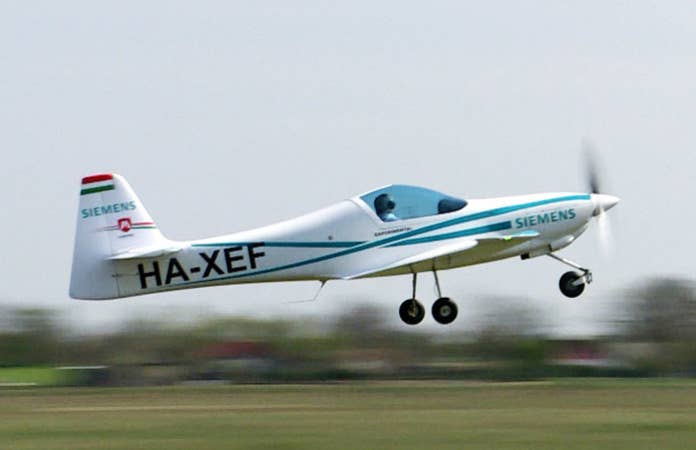
This Magnus eFusion prototype was destroyed on May 31 after a crash just outside Budapest, Hungary, that killed the pilot and a passenger. Siemens
In a setback for the development of electric propulsion systems for general aviation aircraft, one of the few all-electric airplanes in the world crashed in Hungary last week, killing its two occupants.
The Magnus eFusion two-seat prototype, powered by a Siemens electric motor, crashed near Budapest after witnesses said the airplane caught on fire. The cause has yet to be determined, but the early worry is that the airplanes batteries may be to blame.
In a statement, Magnus offerd the following details of the crash: “On 31 May 2018, a Magnus eFusion experimental aircraft took off at 10:10 a.m. and while completing its test flight – due to yet unknown reasons and circumstances – crashed into the corn field between the settlements Pogány and Szalánta. As a consequence of this, both the pilot and the passenger of the aircraft lost their lives.”
According to news accounts, witnesses reported seeing the airplane maneuvering at low altitude before catching fire and crashing in a near vertical dive. The impact site was approximately one mile from the Pecs-Pogany Airport (LHPP) and caused a fire on the ground.
Siemens was testing high-power density electric motors and energy density batteries in the aircraft. The motor installed in the prototype had a power output of 260 kW and a weight of 110 pounds. It was powered by lithium-ion battery modules in the nose of the airplane.

Sign-up for newsletters & special offers!
Get the latest FLYING stories & special offers delivered directly to your inbox





![United Airlines secures FAA approval for Starlink, with first commercial flights set for May. Starlink offers 50x faster internet, free for MileagePlus members. [Courtesy of United Airlines]](https://www.flyingmag.com/uploads/2025/03/UnitedAirlines_Starlink_Image.jpg?auto=webp&auto=webp&optimize=high&quality=70&width=1440)
